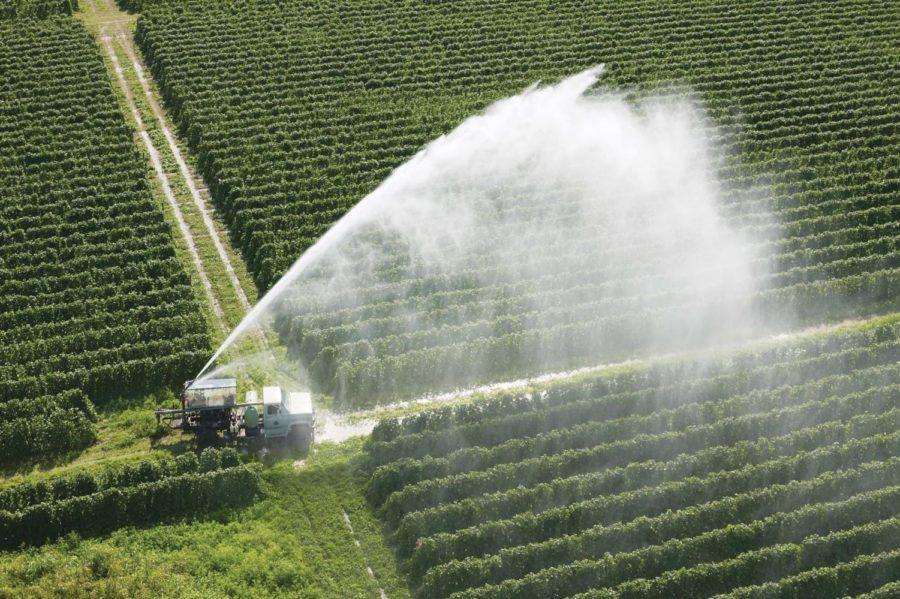Witte: Agriculture, like all fields, needs scrutiny
USA, Florida, Homestead, crops, aerial view
December 12, 2011
When spanning the many disciplines of study, scrutiny and skepticism is not only constant but required. It is part of the scientific method, to question results in order to fully understand the methods in which theory becomes fact. All of the different fields of study come under constant scrutiny.
Whether it be climatology facing the onslaught of climate change deniers (coming from the right) or the field of evolutionary biology and the seemingly increasing numbers of creationists (also from the right), to even economists hearing charges that the “trickle down” theory of economics actually works for the betterment of all (notice a pattern?), many different disciplines regularly ingest large amounts of scrutiny and deal with it on a consistent basis.
However, it seems that, in today’s society, there is still one field that, whenever criticism is taken in, a violent reaction occurs to the point of anger and resentment. Any criticism of the “orthodox” methods in this area are met with such a disdain that it would seem that the criticism itself is done out of spite, and not for the reasons of constructive criticism that the scientific method — which we have all been taught since elementary school — requires.
If you have not realized which field I am referring to, it is our brethren in agriculture. And before I am put on some sort of black list, let me just say to our farmers, agronomists, horticulturalists and all the other -ists that are related with agriculture, that I love agriculture. I would not have a full belly, clothes on my back or a nice shelter without the advancements that have been made on behalf of agriculture in the last 60 years.
That being said, like all other disciplines, there is and ought to be criticism of the methods of which these niceties are procured. Many times, when documentaries, books or news reports are released that critique certain elements of agriculture, many in the field react in such a way that the critic hates farming. This is simply not the case.
The way that I rationalize criticism of agriculture and how I set it apart from criticism of other fields is as follows. If a businessman in some office building hundreds of miles away does something for the rampant pursuit of money, whether it be fraudulent activity or the like, that does not necessarily impact my life or many other people around me.
However, if a poultry farming company hundreds of miles away acts in a manner for the rampant pursuit of money, this action can have a disastrous affect on hundreds, if not thousands, of people. Just last year, a half billion eggs were recalled from across the Midwest because of salmonella. Thousands of people were afflicted by the illness, and thankfully nobody died because of it. This certainly is not an isolated incident, however. It seems that a year cannot go by without some disastrous food-borne illness occurring that leaves a number of people dead.
It is my belief that those in the field of agriculture cannot continue to be so reactionary and resentful toward criticism of their field. Those who are making assessments about agriculture are not doing it because they hate farming; they are merely making judgment calls based on results. And let’s face it, the results are becoming more and more apparent of what big agriculture has done and is doing to the American landscape and American society.
Soil erosion, pollution, an outright dependency on oil and chemicals, not to mention the epidemic of obesity due to how the agriculture policies of state and federal government are shaped. During the Great Depression, for example, the government paid farmers not to grow corn due to the surplus at hand. Today, the federal government pays farmers not only to grow corn, but to grow as much of it as possible, surpluses be damned.
Does stating these facts make me hate farming? Of course not. I, along with others that critique the system are merely pointing out that there can be different ways of conducting agriculture policy in America. And because agriculture is so abundantly important to the lives of billions of people on this planet is the reason that it is under so much scrutiny. And it should be.
So the next time a report, documentary or book is released that is a critique of a certain aspect of agriculture, please meet it with how constructive criticism should be met with, and not with a knee-jerk reaction.

















